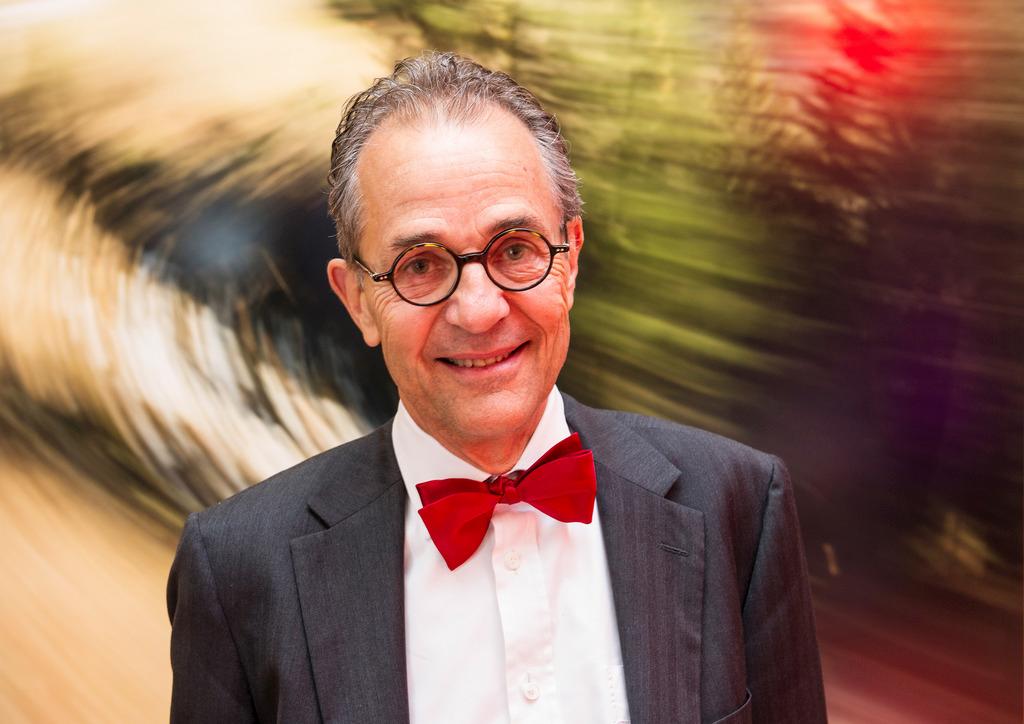The man hoping to be the voice of the Swiss abroad

Former ambassador Tim Guldimann, the first Swiss expat to be elected to the Swiss parliament, aims to give a voice to the Swiss abroad. Guldimann, who lives in Berlin, feels their views and needs are not sufficiently taken into account.
For Guldimann, retirement starts with a new mandate: after leaving the diplomatic service and his post as Swiss ambassador in Berlin, the Zurich Social Democrat will be anything but idle. He was resoundingly elected in his constituency, the canton of Zurich; in a few weeks, he will be sworn in and take up his seat in the House of Representatives.
With his insider knowledge of the workings of federal Bern, where he joined the foreign ministry in 1982, the newly elected parliamentarian will be at home in the legislative body. Nor is he a newcomer to politics: as he likes to point out, he has been a member of the Social Democratic Party for 33 years. He is also a former negotiator for the Organization for Security and Co-operation in Europe (OSCE).
Guldimann has always staunchly defended his wish to stay in Berlin, where he lives with his wife and two daughters of school-going age. In a play on words in his electoral leaflets, he referred to himself as an “international councillor” rather than a “national councillor” (member of the House of Representatives), the usual term for Swiss parliamentarians. He was one of 59 candidates living abroad and seeking a seat in Bern, but the only one to be elected.
Swiss expat voice
Guldimann, who was very active during the electoral campaign and took part in many debates, clearly managed to convince voters that he would represent the interests of his home canton as well as those of the Swiss abroad. Many voters gave him a better position on the electoral lists than his party had assigned him.
While the other members of the new legislature will know only a few weeks from now what committees they will be on, and therefore what priority issues they will be handling, Guldimann already has a list of points that he wants to defend.
“I believe that the Swiss abroad do not receive the attention and respect they deserve,” he explained shortly after being elected. “They contribute greatly to the success of Switzerland, which is one of the most integrated countries, internationally-speaking. But so far, there has been no political debate about what should be done to support them.”
The success of the conservative right in the elections of October 18 will not make this discussion easier, he concedes. Guldimann is a strong advocate of the bilateral path regarding relations with the European Union (EU).
“We should be more confident”
“The European question is very important for the Swiss abroad,” he says. During the campaign, he was one of the only candidates to take a stand on this: “We must settle our relationship with Europe now,” he declared. “We need to secure our future within the European internal market.”
In addition, he argues, “Switzerland is not the small country it often claims to be, to justify its passivity. Thirty European countries have fewer inhabitants and 22 EU members have a smaller economy. Instead of becoming dwarfs, we should have more confidence in ourselves”.
With around 142,000 registered voters (out of 746,000 Swiss living abroad), the electoral body of the “fifth Switzerland” is equivalent to that of cantons such as Valais or Ticino, says the Organisation of the Swiss AbroadExternal link. “It’s a potential political factor,” adds Guldimann.
Technical improvements
“Some people maintain that the number of registered voters living abroad is so low that it is not worth the effort of trying to increase their turnout in votes,” he continues. “We have to break this vicious circle.” More work must also be done to ensure that everyone has the right to vote electronically, as has long been promised.
Guldimann also aims to improve the situation of the Swiss abroad on specific issues such as health insurance and some technical matters regarding the state-run retirement plan and accounts in Swiss banks, which expatriates have increased difficulty in maintaining because of international pressure on banking secrecy.
To those who have criticised him – and will perhaps do so again – for sometimes taking the plane to conduct his parliamentary work in Switzerland, he explains that he is “pragmatic; when I can I take the train, but if I have to, I will go by plane. I laid my cards on the table during the campaign. Anyone who didn’t like it didn’t have to elect me.”
As explained by the Swiss News Agency, the coverage of parliamentarians’ travel costs and other expenses is regulated by the Ordinance on the Resources Allocated to Parliamentarians. Accordingly, Guldimann will be entitled to reimbursement of one round-trip airfare per week during parliamentary sessions. The number of flights for committee meetings is unlimited. He may also claim compensation of CHF400 ($411) per trip.
Meanwhile, for each day spent in session or meetings, the “international councillor” will receive the same per diem as the other deputies, namely CHF115 a day for meals and CHF180 for overnight stays. If he decides to remain in Bern over the weekend during the sessions, he may request an additional contribution to his accommodation costs and one meal.
But, as he himself points out, Berlin is not on the other side of the world. It also takes a long time to reach Bern from other parts of Switzerland.
Resoundingly elected
With more than 102,700 votes, Tim Guldimann was one of the best-elected deputies in the recent elections to the House of Representatives.
In the canton of Zurich, some 22,000 Swiss abroad (living in 176 countries) are registered in a list that has the value of a separate district of the city of ZurichExternal link.
The resultsExternal link of the election of 18 October show that the Swiss abroad voted primarily for the Social Democratic Party (24.51%), the Swiss People’s Party (20.75%), and the Radical Party (17.29%). The other parties won the support of fewer than 10% of Swiss living abroad.
Translated from French by Julia Bassam

In compliance with the JTI standards
More: SWI swissinfo.ch certified by the Journalism Trust Initiative












You can find an overview of ongoing debates with our journalists here . Please join us!
If you want to start a conversation about a topic raised in this article or want to report factual errors, email us at english@swissinfo.ch.